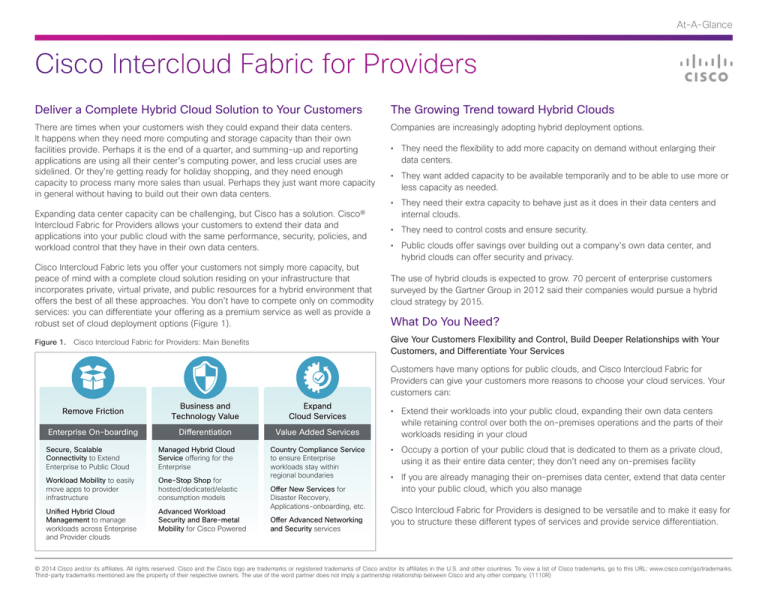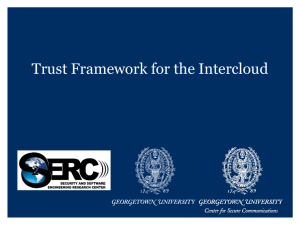
At-A-Glance
Cisco Intercloud Fabric for Providers
Deliver a Complete Hybrid Cloud Solution to Your Customers
The Growing Trend toward Hybrid Clouds
There are times when your customers wish they could expand their data centers.
It happens when they need more computing and storage capacity than their own
facilities provide. Perhaps it is the end of a quarter, and summing-up and reporting
applications are using all their center’s computing power, and less crucial uses are
sidelined. Or they’re getting ready for holiday shopping, and they need enough
capacity to process many more sales than usual. Perhaps they just want more capacity
in general without having to build out their own data centers.
Companies are increasingly adopting hybrid deployment options.
Expanding data center capacity can be challenging, but Cisco has a solution. Cisco®
Intercloud Fabric for Providers allows your customers to extend their data and
applications into your public cloud with the same performance, security, policies, and
workload control that they have in their own data centers.
Cisco Intercloud Fabric lets you offer your customers not simply more capacity, but
peace of mind with a complete cloud solution residing on your infrastructure that
incorporates private, virtual private, and public resources for a hybrid environment that
offers the best of all these approaches. You don’t have to compete only on commodity
services: you can differentiate your offering as a premium service as well as provide a
robust set of cloud deployment options (Figure 1).
• They need the flexibility to add more capacity on demand without enlarging their
data centers.
• They want added capacity to be available temporarily and to be able to use more or
less capacity as needed.
• They need their extra capacity to behave just as it does in their data centers and
internal clouds.
• They need to control costs and ensure security.
• Public clouds offer savings over building out a company’s own data center, and
hybrid clouds can offer security and privacy.
The use of hybrid clouds is expected to grow. 70 percent of enterprise customers
surveyed by the Gartner Group in 2012 said their companies would pursue a hybrid
cloud strategy by 2015.
What Do You Need?
Give Your Customers Flexibility and Control, Build Deeper Relationships with Your
Customers, and Differentiate Your Services
Figure 1. Cisco Intercloud Fabric for Providers: Main Benefits
Customers have many options for public clouds, and Cisco Intercloud Fabric for
Providers can give your customers more reasons to choose your cloud services. Your
customers can:
Remove Friction
Business and
Technology Value
Expand
Cloud Services
Enterprise On-boarding
Differentiation
Value Added Services
Secure, Scalable
Connectivity to Extend
Enterprise to Public Cloud
Managed Hybrid Cloud
Service offering for the
Enterprise
Workload Mobility to easily
move apps to provider
infrastructure
One-Stop Shop for
hosted/dedicated/elastic
consumption models
Unified Hybrid Cloud
Management to manage
workloads across Enterprise
and Provider clouds
Advanced Workload
Security and Bare-metal
Mobility for Cisco Powered
Country Compliance Service
to ensure Enterprise
workloads stay within
regional boundaries
Offer New Services for
Disaster Recovery,
Applications-onboarding, etc.
Offer Advanced Networking
and Security services
• Extend their workloads into your public cloud, expanding their own data centers
while retaining control over both the on-premises operations and the parts of their
workloads residing in your cloud
• Occupy a portion of your public cloud that is dedicated to them as a private cloud,
using it as their entire data center; they don’t need any on-premises facility
• If you are already managing their on-premises data center, extend that data center
into your public cloud, which you also manage
Cisco Intercloud Fabric for Providers is designed to be versatile and to make it easy for
you to structure these different types of services and provide service differentiation.
© 2014 Cisco and/or its affiliates. All rights reserved. Cisco and the Cisco logo are trademarks or registered trademarks of Cisco and/or its affiliates in the U.S. and other countries. To view a list of Cisco trademarks, go to this URL: www.cisco.com/go/trademarks.
Third-party trademarks mentioned are the property of their respective owners. The use of the word partner does not imply a partnership relationship between Cisco and any other company. (1110R)
At-A-Glance
The relationship you build with customers by the hosting of all or a portion of their
data centers helps you build closer relationships and develop additional business
opportunities. It offers an excellent way to prove your reliability and demonstrate that
you’re willing and able to go beyond what is required to support your customers. With
Cisco Intercloud Fabric for Providers, the differentiated services that you can offer your
customers can secure your role as a trusted technology partner who understands your
customers’ critical business needs.
Aggregate Cloud Services from Other Providers So You Can Be the Single Point of
Contact for Your Customers
Customers may want to use not only your cloud, but also those offered by other cloud
providers. For example, regulatory oversight may require them to use a cloud within
a particular country. One provider may specialize in their industry. Or they may simply
like a given provider. You can offer your customers access to one, two, or more public
clouds by configuring Cisco Intercloud Fabric for Providers to support these hybrid
cloud deployments transparently, letting you become a cloud aggregator for your
customers and serve as their single point of contact for cloud services. This gives you
another way to differentiate your service from your competitors (Figure 2).
Use Cases
Cisco Intercloud Fabric for Providers use cases include the following:
• Capacity Augmentation: For example a retailer may need more capacity during
peak shopping seasons, and a company may need more computing power to
generate quarterly reports. Customers may also need more capacity when their
contact centers are handling peak numbers of calls or they’re opening new facilities
that strain their existing data centers. It’s critical that the capacity they add be
indistinguishable from what their own data centers already provide. In this hybrid
cloud, the public and private merge transparently both in the way that employees
can use the additional resources and in the customer’s management of IT.
• Development and Testing: A customer’s encapsulated data center in your public
cloud is an excellent place to test and develop new software. The development and
testing don’t use data center resources that the company needs for day-to-day
operations. When testing is completed, the software is ready to move into regular
operations because it has been tested in the same environment in which it will run.
• Disaster Recovery: If disaster strikes, customers will benefit from a transparent
extension of their on-premises data centers in your public cloud. They will have
copies of their applications and their basic data center configurations. Customers
can regenerate their policies and rules, recover much of their data, and continue to
work even if the primary data center is down.
Figure 2. Become a Cloud Aggregator
Provider Benefits
• Deliver complete managed cloud
solution incorporating private, virtual
private and public resources
• Provide composite environment
leveraging ‘best fit’ clouds
Intercloud Fabric
for Business
Cisco Intercloud Fabric
Intercloud Fabric
Provider Platform
• Avoid competing on low margin,
commodity workloads while
maintaining overall management
• Differentiate on both customer
Public Cloud and VPC Public
Cloud performance
VPC
Windows
Azure
Monetize
with Existing Data
Center Services
Amazon.com
Web Services
Cisco Intercloud
Fabric
• Provide country compliance service
Customer DC or Cloud
for workloads to stay within regional (Provider Managed or CPE)
boundaries
Provider Cloud
Compute
Hosted
Security
Backup
In Country
Provider Cloud
DRaaS
Archive
Intercloud Fabric
Provider Platform
Cisco Intercloud Fabric for Providers
Table 1 describes the main services of Cisco Intercloud Fabric for Providers.
Table 1. Main Services
Service Name
Description
Cisco Intercloud
Fabric for
Providers
Cisco Intercloud Fabric for Providers is a virtual appliance that is deployed
and managed by cloud providers. Cisco Intercloud Fabric for Providers
enables providers to quickly offer hybrid clouds without building or adding
their own APIs. It provides integration with the provider’s environment
and helps enable onboarding of workloads from the enterprise to the
provider’s cloud.
Cisco Intercloud
Fabric for
Business
Cisco Intercloud Fabric for Business is licensed by the service provider for
managed hosting deployment. A provider offering a managed service can
use Cisco Intercloud Fabric for Business at the enterprise end and Cisco
Intercloud Fabric for Providers at the provider cloud. Cisco Intercloud
Fabric for Business includes the Cisco Intercloud Fabric Director and
Cisco Intercloud Fabric Secure Extender components. Cisco Intercloud
Fabric Director includes an end-user and IT administrator portal to enable
self-service consumption of hybrid cloud resources as well as policy
management across hybrid cloud environments. The Cisco Intercloud
Fabric Secure Extender component enables secure connectivity across
multiple clouds while helping ensure consistency of network and security
policies across private and public clouds.
For More Information
For more information about successful real-world implementations and best practices,
visit: www.cisco.com/go/intercloudfabric.
© 2014 Cisco and/or its affiliates. All rights reserved. Cisco and the Cisco logo are trademarks or registered trademarks of Cisco and/or its affiliates in the U.S. and other countries. To view a list of Cisco trademarks, go to this URL: www.cisco.com/go/trademarks.
Third-party trademarks mentioned are the property of their respective owners. The use of the word partner does not imply a partnership relationship between Cisco and any other company. (1110R)
C45-730806-01 08/14


